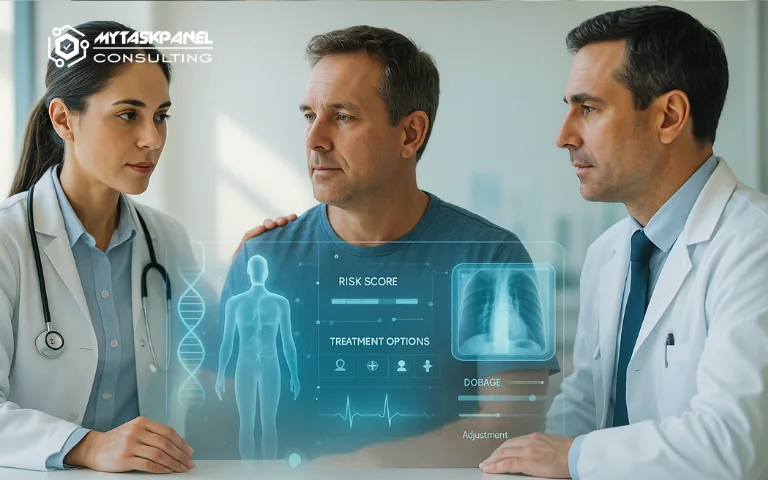In recent years, artificial intelligence has gone from being a futuristic concept to becoming a concrete and powerful tool within the healthcare sector. More and more clinics, hospitals, laboratories, and startups are integrating AI into their processes, from patient care to clinical decision-making. One of the areas where its impact is most evident is in personalized diagnosis and treatment. Thanks to its ability to analyze large volumes of medical data, images, clinical histories, and genetic patterns, AI is enabling each patient to be treated more accurately, quickly, and efficiently. In this article, we’ll look at how AI impacts healthcare, focusing on the improvements it is already bringing to diagnosis and treatment, and why this represents a key opportunity for companies and organizations in the sector.
What does the use of AI in healthcare imply?
When we talk about AI in healthcare, we refer to the use of technologies capable of learning from medical data, identifying patterns, making predictions, and assisting medical professionals in their clinical decisions.
This includes everything from algorithms that detect diseases in medical images to systems that recommend personalized treatments based on each patient’s profile. Unlike other sectors, in healthcare mistakes can cost lives, so the application of AI is not meant to replace professionals, but to strengthen their analytical capacity, reduce errors, and improve outcomes.
Faster and more accurate medical diagnosis
One of AI’s greatest contributions to healthcare is in the diagnostic process. With its ability to process large volumes of data, it can detect early signs of diseases that sometimes go unnoticed by the human eye.
Example: image-based diagnosis
Today, there are algorithms trained with millions of medical images (X-rays, CT scans, MRIs) that can identify signs of diseases such as cancer, pneumonia, or fractures with levels of accuracy equal to or higher than that of an experienced radiologist.
Advantage: diagnosis can be made in seconds, with minimal error rates, helping detect diseases at early stages and improving survival rates.
Example: detection of rare diseases
AI is also useful in recognizing unusual patterns, such as those found in rare or chronic diseases. By analyzing symptoms, family history, and genetic studies, it can suggest diagnostic hypotheses that would otherwise take weeks or months.
Advantage: speeds up diagnosis, avoids unnecessary tests, and improves the patient experience.
Personalized treatments: the future of medicine has arrived
Every patient is different: their genetics, lifestyle, and previous conditions. However, traditional treatments often follow a one-size-fits-all approach.
AI is changing this. By analyzing each individual’s specific information, it can recommend the most effective treatment, with fewer side effects and higher chances of success.
Example: personalized oncology
In many healthcare centers, AI is already used to analyze genetic profiles of tumors and suggest targeted therapies for each type of cancer. This avoids the use of generic treatments and increases effectiveness.
Advantage: higher response rates, lower toxicity, and better quality of life for the patient.
Example: Optimized dosing
There are also systems that adjust drug dosages based on individual parameters such as age, weight, medical history, and even real-time blood level monitoring.
Advantage: reduces the risk of errors and adverse reactions.
AI in healthcare: real applications in clinics and hospitals
More and more healthcare centers are incorporating AI solutions into different processes.
Some concrete examples:
- Smart triage: systems that prioritize patients based on the severity of their symptoms, helping optimize emergency care.
- Medical chatbots: assistants that answer common questions, perform pre-diagnoses, or manage appointments.
- Remote monitoring: connected devices that collect patient data (blood pressure, glucose, heart rate) and alert doctors to anomalies.
- Clinical decision support: tools that suggest diagnoses or treatments based on medical evidence and big data.
What organizational benefits does AI bring to healthcare?
For executives in the healthcare sector, adopting AI not only improves patient care—it also creates strategic and operational advantages:
1. Operational efficiency
Automating repetitive or high-volume tasks (like reading medical images) frees up professionals to focus on more complex activities.
2. Cost reduction
A faster, more accurate diagnosis—or a more effective treatment from the start—reduces spending on tests, hospital stays, and unnecessary procedures.
3. Improved service quality
AI helps deliver faster, more personalized, evidence-based care, increasing patient satisfaction.
4. Access to new revenue streams
Companies that develop, integrate, or sell AI-based solutions can create new business models, partnerships, or differentiated services.
Challenges to consider
Despite its potential, implementing AI in healthcare requires addressing certain challenges:
- Privacy and data protection: medical information is extremely sensitive, so it must be managed securely and in compliance with regulations.
- Clinical validation: every solution must be scientifically validated and comply with regulatory standards.
- Cultural change: medical staff must trust the tools, understand how they work, and actively participate in their adoption.
- Technological infrastructure: requires organized databases, system interoperability, and proper connectivity.
How can healthcare organizations prepare?
To successfully adopt AI in healthcare, organizations should:
- Identify areas with high data volume or repetitive tasks.
- Evaluate existing solutions in the market or develop tailored projects.
- Form multidisciplinary teams that include doctors, technicians, and developers.
- Prioritize security and regulatory compliance from the design stage.
- Measure the impact of implemented solutions with clear KPIs.
Partnering with a specialized technology provider can make the difference between a successful implementation and an unproductive experiment.
AI’s influence in healthcare is no longer a promise—it is a reality that is transforming how diseases are diagnosed and treatments are defined.
Through data analysis, intelligent automation, and the ability to personalize care, artificial intelligence is becoming a key ally in improving service quality, reducing costs, and boosting clinical outcomes.
For healthcare executives, now is the ideal time to explore this technology, evaluate concrete opportunities, and lead the transformation toward smarter, more human, and more efficient care.
Are you interested in exploring how AI could be applied in your clinic, hospital, or healthcare company? From automated diagnostic solutions to personalized assistants, there are many ways to leverage this technological revolution. Contact us to discover how to take the next step.

